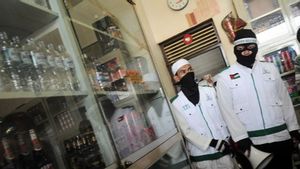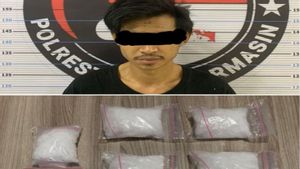JAKARTA - Chairman of the Indonesian Ulema Council (MUI) for Fatwa Asrorun Niam Sholeh emphasized that the winemerek drink product, Nabidz, based on the results of laboratory examinations, has a high alcohol content so it is forbidden for Muslims to consume.
Niam said that the MUI Fatwa Commission had received information about three different laboratory test results which indicated that the product's alcohol content was relatively high, exceeding the alcohol content limit that Muslims could consume.
"From the three lab test results, it is known that the alcohol content in Nabidz products is quite high, it is forbidden to consume Muslim (by)," he said as quoted by ANTARA, Tuesday, August 22.
Niam said the results of the laboratory examination showed that the halal certification process for Nabidz products was problematic.
According to the guidelines and halal standards, the MUI does not determine the halalness of products that use names that are associated with the haram in terms of taste, aroma, and packaging.
"Especially if the process involves fermented wine with yeast, exactly like the manufacture of awine," he said.
Niam explained that the MUI Fatwa Number 4 of 2003 concerning Halal Standardization mentioned four criteria for the use of names and materials, including not being allowed to consume and use the names and/or symbols of food and/or drinks that lead to fraud and batulilan.
The next criterion is that it is not permissible to consume and use the names and/or symbols of food or drinks that lead to the names of prohibited objects/men, including babi dankhamr, except those that have been traded and certainly do not contain elements that are forbidden such as the names of meatballs, noodles, bakwan, bakpia, and bakpao.
اقرأ أيضا:
According to the MUI Fatwa, it is also not permissible to consume and use mixed ingredients for food or beverage components that cause a taste / taste of objects or animals that are forbidden, such as instant pork.
The MUI fatwa also states that it is not permissible to consume food or drinks that use the names of prohibited foods or drinks such as wahisky, brandy, danbeer.
Meanwhile, MUI Fatwa Number 10 of 2018 concerning food and beverage products containing alcohol / ethanol states that alcoholic beverages categorized as alcohol / ethenol (C2H5OH) are 0.5 percent.
Meanwhile, the Head of the Halal Product Guarantee Administration Agency (BPJPH) of the Ministry of Religion, Aqil Irham, emphasized that his institution has never issued a halal certificate forwine products.
"Regarding the information on the online sale of awine product with the Nabidz brand which is claimed to have been halal certified, we need to emphasize that BPJPH has never issued a halal certificate for a marriage product," he said.
Aqil revealed that the owner of the name Nabidz had indeed submitted a halal certification and was registered in the Silal system, but the submission was intended for fruit juice drink products, not awine.
MUI also stated that it had never issued a halal determination for the Nabidzwine product.
The English, Chinese, Japanese, Arabic, and French versions are automatically generated by the AI. So there may still be inaccuracies in translating, please always see Indonesian as our main language. (system supported by DigitalSiber.id)
















